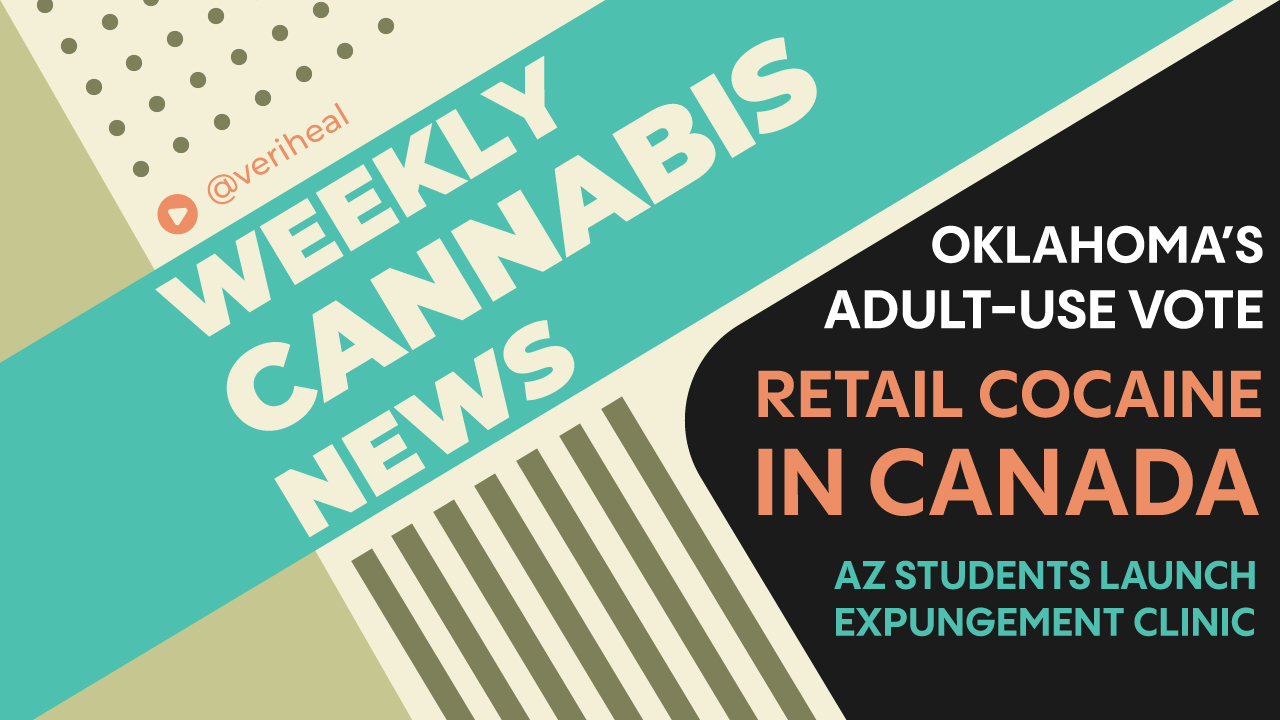Oklahomans’ cannabis vote ended on a sour note, a Canadian dispensary is facing backlash over cocaine sales, and Arizona law students are offering free expungement services.
Let’s dive into this week’s cannanews.
Oklahomans Vote on Cannabis Legalization
Earlier this week, Oklahoma voters had a big decision to make on the ballot. Question 820 asked Oklahomans whether cannabis should be legal for those 21+. The initiative was initially supposed to be featured on the state’s 2022 ballot, but legal challenges kept it from being included until now.
Beyond legalizing cannabis, Question 820 would also make it legal to possess up to 1 ounce of cannabis and to grow up to six mature plants at home. All cannabis sales would come with a 15% tax.
Supporters of the bill recently released an economic analysis of what legalized cannabis could do for the state. Their analysis found that legalized recreational cannabis could bring the state $434 million in tax revenue in its first four years.
Update: Oklahoma’s legalization initiative has failed. At last count, 62% of Oklahomans voted against legalization, and only 23% voted in favor.
Canadian Company Receives Approval to Sell Cocaine
Canadian cannabis company Adastra Labs made headlines last month when it announced it received a license to sell cocaine. Adastra Lab’s announcement led to outrage and confusion from the general public. Most notably, British Columbia Premier David Eby and Prime Minister Justin Trudeau shared their “astonishment” that Health Canada allowed a company to sell a hard drug like cocaine.
Why You Should Get Your Medical Marijuana Card
Veriheal has satisfied millions of patients nationwide by giving them access to these benefits
- Larger purchase limits
- Peace of mind
- Enhanced legal protection
- Access to higher potency strains
- Save up to 25% on cannabis purchases
- Skip the line at the dispensary
To clear up the confusion, Adastra Lab released another statement on March 3. There, they clarified that although the company received a controlled substance license, it did not allow the company to sell cocaine to the general public. The license, Adastra said, only allowed them to sell to licensed dealers, pharmacists, practitioners, and other qualified professionals.
Though Adastra’s newest statement cleared up most of the confusion, one big question still remains. What’s the purpose of allowing Adastra to sell cocaine—even if only to qualified professionals? Well, it all has to do with British Columbia’s recently announced three-year decriminalization experiment.
Between January and June 2022 alone, the opioid crisis claimed the lives of 3,556 Canadians. B.C. is looking to provide folks with small amounts of safe and clean hard drugs that can only be consumed in an environment where they are monitored by a trained professional. The hope is that this will encourage those struggling with addiction to seek professional help rather than turning to unsafe illicit drugs.
What do you think about the big controversy around Adastra’s announcement? What do you think of B.C.’s plan to tackle the opioid crisis? Let us know in the comments!
Arizona Law Students Host Expungement Events
University of Arizona law students are doing their part to help those affected by the war on drugs. They are hosting a series of expungement events where locals can stop by to get their low-level cannabis convictions expunged. In many instances, even low-level cannabis can drastically impact your employment and housing opportunities.
According to KGUN 9, locals are already taking advantage of the event. One Arizonan even managed to get a cannabis charge from 1979 cleared from their record. “It’s a great feeling when someone walks out with a cleared record. It could be pretty life-changing,” said Mia Burcham, one of the law students participating in the event.
The expungement process is relatively easy, requiring only the date and location of the cannabis charge. As such, Burcham and others running the event have been training and asking for more volunteers to join.
Interested in checking out one of U of A’s expungement events? The next one is taking place on March 25!
Author, Share & Comments
















